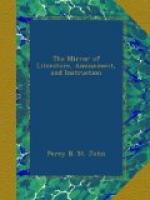“The wine now began to circulate more freely round the table, and the tongues of the company to get looser in their heads. Miss Snooks also commenced talking at a greater stretch than she had hitherto done. I soon found out that she was a poetess, and had written a couple of novels, besides two or three tragedies. In fact, her whole conversation was about books and authors, and she did us the favour of reciting some of her own compositions. She was also prodigiously sentimental, talked much about love, and was fond of romantic scenery. I know not how it was, but although her conversation was far from indifferent, it excited ridiculous emotions in my mind, rather than any thing else. If she talked of mountains, I could think of nothing but the hump upon her nose, which was, in my estimation, a nobler mountain than Helvellyn or Cairngorm. If she got among promontories, this majestic feature struck me as being sublimer than any I had ever heard of—not excepting the Cape of Good Hope, first doubled by Vasco de Gama.—When she conversed about the blue loch and the cerulean sky, I saw in the tip of her nose a complexion as blue or cerulean as any of these. It was at once a nose—a mountain—a cape—a loch—a sky. In short it was every thing. She was armed with it, as the Paladins of old with their armour. Nay, it possessed the miraculous property of rendering a human being invisible, of concealing Mr. Hookey from my eyes; thus rivalling the ring of Gyges, and casting the invisible coat of Jack the Giant-killer into the shade.
“After conversing with her for some time upon indifferent matters, she asked me if I was fond of caricatures, and spoke particularly of the designs of George Cruikshank. Scarcely had she mentioned the name of this artist, than I was seized with a strange shuddering. In one moment I called to mind his illustrations of Punch and Judy, at which we had been looking, before coming down to supper. A clue was now given to the otherwise unaccountable train of feelings, which had possessed me ever since I saw Miss Snooks. From the moment when I first set my eyes upon her, I fancied I had seen her before; but where, when, and upon what occasion I found it impossible to tell. Her squeaking voice, her blue twinkling eyes, her huge frilled cap, and above all, her mighty nose, all seemed familiar to me. They floated within my spirit as a half-forgotten dream; and without daring to whisper such a thing to myself, I still felt the impression that all was not new—that the novelty was not so great as I imagined.
“But Punch and Judy set all to rights. I had seen Miss Snooks in George Cruikshank, and at once all my perplexing feelings were accounted for. She was Judy—she was Punch’s wife. Yes, Miss Snooks, the old maid, was the wife of Mr. Punch. There was no denying the fact. The same small weazel eyes, the same sharp voice and hooked chin, and the same nose—at once mountain, cape, &c. &c. belonged alike to Judy and Miss Snooks. They were two persons; the same, yet, different—different, yet the same—the one residing in the pages of Cruikshank, or chattering and fighting in the booths of mountebanks at Donnybrook or St. Bartholomew’s Fair—the other seated bolt upright, at the head of her cousin’s table, beside a small coterie of litterateurs.




